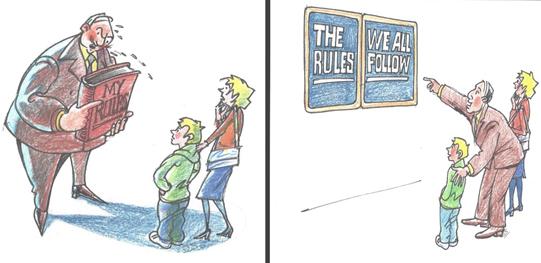These two words, which share so many letters , mean too directly opposite things. Let's start by looking at the definitions (I've used the Cambrudge online dictionary):
We have three definitions for Authoritative:
having the power of special knowledge, showing that you are confident, having complete and accurate information, and being in control and therefore respected and obeyed.
There is only one for Authoritarian:
Demanding total obedience to those in positions of authority and refusing to allow people the freedom to act as they wish.
Now we have those clear explanations, what does it mean to us as parents?
It is not difficult to tell which of these sounds more socially acceptable in today's world. But some people do think that children should be totally obedient to their parents because their parents are "in authority". In our blog "Are you seeking control over or co-operation from your children?" we explain why a co-operative family is better for everyone than a controlled family.
Boundaries and family heirarchies are important (we're writing a blog on that shortly). Even in the most harmonious family there are times when the practical solution to whatever is troubling you is to "pull rank". We don't have to apologise for that. However, let's look again at those two definitions. Actually we can rename them as two types of authority. Like this:
Authentic authority and inauthentic authority
Do you as a parent have 'special knowledge'? That is often the case...
Are you are a confident parent? Let's hope so!
Is your 'information' complete and accurate? When it comes to parenting, information is what you are thinking about the situation. It's not something fixed.
If you can answer yes to all three questions then you have authority and your actions will be authoritative. Your children will comply with you. But if you aren't in that position and you try to be authoritative you will come across as authoritarian, imposing your will by power plays, and your children will become oppositional. You have two choices now... be even more coercive and dominant, or lose control.
If your underlying message is ‘You are being bad - either confront me or comply’ then the child who is unable or unwilling to comply has only one alternative - to confront.
If the underlying message is ‘You are in control - make the right choices’ then the child is not boxed into a corner.
In essence, it’s worth avoiding the authoritarian approach. Instead use tactical ignoring, humour, wit, and appreciative enquiry, and make sure the child understands your real needs . If you have 'special knowledge' or more complete and accurate information then share it - express your feelings honestly and start by asking the children to do what you want.
If you can't be authoritative, then don't try to be authoritarian. Instead, put yourself in a position where you can answer those three questions "yes". Often, that starts with re-evaluating what you are trying to achieve. Look at the situation in a different light. Perhaps there are new and different 'facts' you have not been paying attention to? Why not talk to the children about the situation adn see what they have to say. The best time to talk is not when you are in the situation, but later when you find yourself in a teachable moment with your child.

